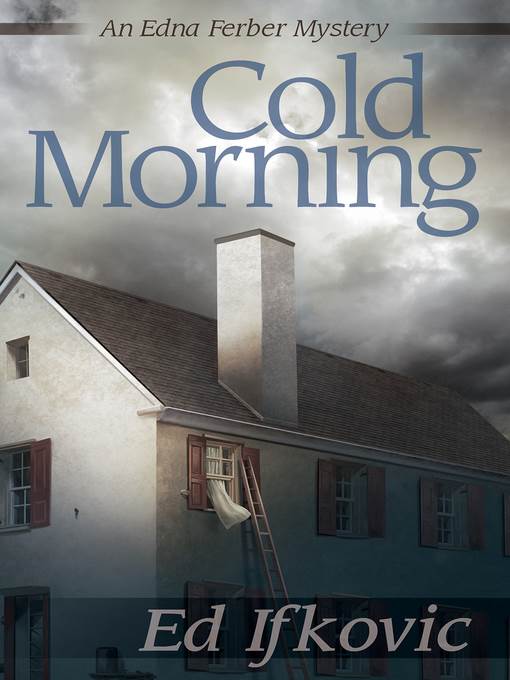
Cold Morning
Edna Ferber Mysteries Series, Book 7
کتاب های مرتبط
- اطلاعات
- نقد و بررسی
- دیدگاه کاربران
نقد و بررسی

January 4, 2016
The little town of Flemington, N.J., provides the setting for Ifkovic’s intriguing seventh mystery featuring novelist Edna Ferber (after 2015’s Café Europa). There she and a glittering array of celebrities, including Damon Runyon, Dorothy Kilgallen, James Cagney, and Jack Benny, gather in early 1936 for the circus-like trial of Bruno Richard Hauptmann, a German-born carpenter, for the kidnapping and murder of aviator Charles Lindbergh’s 20-month-old son in 1932. The New York Times pairs Edna with New Yorker writer Alexander Woollcott, who share their barbed observations of the trial in sometimes labored exchanges. Though the public of the time view Lindbergh as a hero, he can be unpleasant in private. Edna is one of the few skeptical of Hauptmann’s guilt. Meanwhile, the strangulation of waitress Annabel Biggs and the arrest of bumpkin Cody Lee Thomas for her murder draw Edna away from the trial and, eventually, into a plausible alternative explanation for the Lindbergh crime. History buffs will enjoy this one.

December 15, 2015
Now that he's seen her through six murder cases (Cafe Europa, 2015, etc.), Ifkovic turns sleuthing novelist/playwright Edna Ferber loose on the biggest game of all: the Lindbergh kidnapping. Everyone who's anyone seems to have come to Flemington, New Jersey, to watch Bruno Richard Hauptmann go on trial for having caused the death of Little Lindy, the infant he's accused of taking from his nursery. The real-life celebrities in attendance include Damon Runyon, Adela Rogers St. Johns, Sheilah Graham, Ginger Rogers, Dorothy Kilgallen, and, most influentially, Walter Winchell. The New York Times has added to the mix of "scribbling gladiators in a Jersey Circus Maximus" by sending Edna and her Algonquin Round Table frenemy Alexander Woollcott to nose out human-interest stories and file columns. Woollcott is only too happy to join the crowd baying for the German immigrant's blood. But while Woollcott fiddles, Edna burns. Though she deplores the spectators' rush to judgment on Hauptmann, she's less interested in the question of his innocence or guilt than in the press' shameful neglect of Annabel Biggs, the Cockney waitress in the local cafe apparently strangled to death by her boyfriend, guileless Newark bumpkin Cody Lee Thomas, and her roommate, Peggy Crispin, whose fears about being stalked and having her room searched were silenced for good when she froze to death a few nights later. Ifkovic's interweaving of these two neglected fatalities and the celebrated Lindbergh case is more workmanlike than inspired. So is the solution he propounds to the kidnapping. But the rounds between Edna and Woollcott draw real blood, and Edna's jaundiced view of American journalistic justice is both troubling and unsettlingly timely. Perhaps the finest hour yet for a fictionalized heroine who defends herself against undue prejudice in favor of a supremely unpopular defendant by saying, "I have taken no position--except doubt."
COPYRIGHT(2015) Kirkus Reviews, ALL RIGHTS RESERVED.

February 1, 2016
Almost three years after the 1932 kidnapping and murder of the son of aviation hero Charles Lindbergh, Bruno Richard Hauptmann is put on trial for the crime in Flemington, NJ. Novelist Edna Ferber and Aleck Woollcott (of Algonquin Round Table writers' group fame) are hired by the New York Times to cover the story. Edna's attention is diverted by the killing of a young waitress at their hotel who claimed inside knowledge of the abduction. Who benefited the most from the murder of Annabel Briggs? The simple rube from the Jersey sticks who is immediately arrested and charged? Or, someone closer to the Lindbergh family who has much to conceal about both the kidnapping and the death of Little Lindy? Capturing the period's frenzied anti-German sentiment and yellow journalism, this mystery presents an exciting perspective on an early "trial of the century." VERDICT The seventh entry in Ifkovic's historical series (after Cafe Europa) continues to entertain with Woollcott and Ferber trading barbs and bon mots with Walter Winchell and Adela Rogers St. John from the Hearst syndicate.
Copyright 2016 Library Journal, LLC Used with permission.

December 15, 2015
Chronologically, the seventh Edna Ferber mystery fits in between numbers four and five. It's set in the mid-1930s. The trial of Bruno Richard Hauptmann, accused (and pretty much already convicted in the press) of kidnapping the child of Charles Lindbergh, is about to begin. Edna, among many other journalists, is covering the story, but, unlike most of her colleagues, she isn't so sure Hauptmann is guilty. Ifkovic takes what would have been major risks had this novel been written at the time or soon after the trial, chief among them showing skepticism for Hauptmann's guilt and doubts about Lindbergh's squeaky-clean image. As usual in this series, the writing throws us into the historical context completely, making us feel the societal pressure to convict Hauptmann quickly. Like Max Allan Collins in Stolen Away, Ifkovic develops a realistic scenario for what might have really happened to the Lindbergh baby. Largely unknown today, Ferber has emerged in this series as perhaps the most compelling of all the many real-life authors turned fictional sleuths in the genre.(Reprinted with permission of Booklist, copyright 2015, American Library Association.)

























دیدگاه کاربران